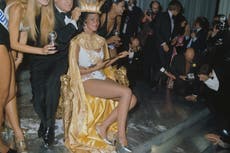‘Essex girl’ removed from dictionary after campaigners say it is offensive
Term defined as woman who ‘is not intelligent’ and ‘very willing to have sex’
The phrase “Essex girl” has been removed from a dictionary after a campaign group said it was offensive.
According to the Oxford University Press, “Essex girl” was previously defined as: “a name used especially in jokes to refer to a type of young woman who is not intelligent, dresses badly, talks in a loud and ugly way and is very willing to have sex”.
Following a campaign by the Essex Girls’ Liberation Front, the term has now been removed from the Oxford Advanced Learner’s Dictionary, which is used to teach non-native English speakers.
The campaign group, which is led by the author Syd Moore, said using the expression was “very offensive”.
Referencing the “Essex girl” at an International Women’s Day conference, Moore told TheTimes: “Women from the Congo had heard of the Essex girl.
“I thought, ‘It’s time to get rid of this once and for all’.”
Upon hearing the news that the phrase is to be removed from the dictionary, Moore tweeted: "Ladies and gentlemen- here is the news. Proof that, if you put your mind to it, you CAN CHANGE THINGS.
“Big up to all my fellow frontiers and campaigners. Today is a day to celebrate.”
The phrase will however still be included in the Oxford English Dictionary (OED), which defines “Essex girl” as a derogatory term for a “type of young woman, supposedly found in and around Essex, and variously characterised as unintelligent, promiscuous and materialistic”.
The OED said it would not remove the term because it is a “historical dictionary”, in which nothing is ever taken out.
Moore’s campaign was backed by another group, Snapping the Stiletto, which is dedicated to stopping women being degraded. The initiative was given a £200,000 lottery grant and supported by Essex born women, including model Penny Lancaster, from Chelmsford, and Dame Helen Mirren, born in Southend-on-Sea.
The county's tourist board has also weighed in on the debate, releasing a publicity video entitled “This is Essex”, to help the cause.
Gemma Collins, one of the stars of ITV reality show The Only Way Is Essex, previously told Sky News she was against the use of the term.
“I think the dictionary should be paying everyone in Essex compensation,” she said.
“We have evolved over the years. It is very derogatory what has been said about us. And it does need to be changed.”
Join our commenting forum
Join thought-provoking conversations, follow other Independent readers and see their replies
Comments

Bookmark popover
Removed from bookmarks